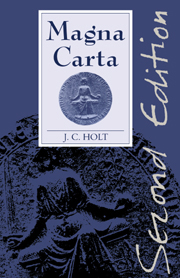Book contents
- Frontmatter
- Dedication
- Contents
- List of plates
- Preface
- Preface to second edition
- Acknowledgements
- Abbreviations
- 1 The Charter and its history
- 2 Government and society in the twelfth Century
- 3 Privilege and liberties
- 4 Custom and law
- 5 Justice and jurisdiction
- 6 Crisis and civil war
- 7 Quasi Pax
- 8 The quality of the Great Charter
- 9 The achievement of 1215
- 10 From distraint to war
- 11 The re-issues and the beginning of the myth
- Appendices
- 1 The meeting at Bury St Edmunds, 1214
- 2 Notification of Thomas count of Perche, February 1215
- 3 Triplex forma pacis
- 4 The ‘unknown’ charter
- 5 The Articles of the Barons
- 6 Magna Carta, 1215
- 7 Translations of the Charters
- 8 The Twenty-Five barons of Magna Carta, 1215
- 9 The date of the London treaty
- 10 The Oxford Council, 16-23 July 1215
- 11 Select documents illustrative of the history of Magna Carta, 1215
- 12 Magna Carta, 1225
- 13 Charter of the Forest, 1225
- 14 Liberties and perpetuity
- References
- Index
14 - Liberties and perpetuity
Published online by Cambridge University Press: 05 October 2014
- Frontmatter
- Dedication
- Contents
- List of plates
- Preface
- Preface to second edition
- Acknowledgements
- Abbreviations
- 1 The Charter and its history
- 2 Government and society in the twelfth Century
- 3 Privilege and liberties
- 4 Custom and law
- 5 Justice and jurisdiction
- 6 Crisis and civil war
- 7 Quasi Pax
- 8 The quality of the Great Charter
- 9 The achievement of 1215
- 10 From distraint to war
- 11 The re-issues and the beginning of the myth
- Appendices
- 1 The meeting at Bury St Edmunds, 1214
- 2 Notification of Thomas count of Perche, February 1215
- 3 Triplex forma pacis
- 4 The ‘unknown’ charter
- 5 The Articles of the Barons
- 6 Magna Carta, 1215
- 7 Translations of the Charters
- 8 The Twenty-Five barons of Magna Carta, 1215
- 9 The date of the London treaty
- 10 The Oxford Council, 16-23 July 1215
- 11 Select documents illustrative of the history of Magna Carta, 1215
- 12 Magna Carta, 1225
- 13 Charter of the Forest, 1225
- 14 Liberties and perpetuity
- References
- Index
Summary
‘We have also granted to all the free men of our realm for ourselves and our heirs for ever (in perpetuum) all the liberties written below.’ Thus cap. 1 of Magna Carta. The words are repeated in cap. 63 in corroboration – ‘the men in our realm shall have and hold all the aforesaid liberties … for ever (in perpetuum), as is aforesaid’. The immediate precedent is contained in the Charter itself. Cap. 1 opens – ‘In the first place [we have] granted to God and by this our present Charter have confirmed, for us and our heirs in perpetuity, that the English church shall be free …’, and also – ‘we conceded and confirmed by our Charter, freedom of elections … which we shall observe and wish our heirs to observe in good faith in perpetuity’. Here the Charter repeated John's grant of freedom of election to the church of 21 November 1214 – ‘libere sint in perpetuum electiones’. So cap. 1 of the Charter elides very easily from the liberties of the church to the liberties of the realm. It is as if ecclesiastical liberties infected all the rest, the whole placed within the broader notion of free and perpetual alms, the Community of freemen viewed as if it were as permanent and undying as the church itself with all its component institutions. If so, the infection was a strong one; all subsequent reissues of the Charter and the Charter of the Forest are grants made in perpetuity.
- Type
- Chapter
- Information
- Magna Carta , pp. 518 - 522Publisher: Cambridge University PressPrint publication year: 1992



